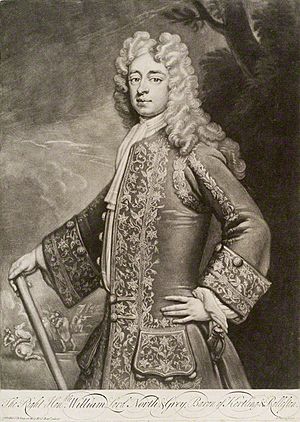William North, 6th Baron North facts for kids
William North, 6th Baron North and 2nd Baron Grey (born 1678 – died 1734), often called Lord North and Grey, was an English soldier and a nobleman. He was part of the English nobility for over 40 years. This meant he had the right to be a member of the House of Lords, which is part of the British Parliament. He sat there from 1698 to 1734, though he spent his last 12 years living in other countries.
Lord North and Grey was the first person in his family to become a professional soldier. He rose through the ranks to become a Lieutenant General, a very high position. However, his career faced problems after Queen Anne died. This was because he was known to support the Jacobites. The Jacobites believed that the Stuart family, not the current royal family, should rule Britain.
After being arrested for being involved in a plan called the Atterbury Plot, he was later released because there wasn't enough proof against him. After this, Lord North and Grey joined the army of King Philip V of Spain. He passed away in Madrid, Spain.
Contents
Early Life and Family Background
William North was born in a place called Caldecote, Cambridgeshire. His father was Charles North, 5th Baron North. When his father died in 1691, William inherited two important noble titles: Baron North and Baron Grey. This is why he was known as Lord North and Grey.
His family was quite clever and well-known for their minds. His uncle, Francis North, became a very important judge called the Lord Chancellor. Other uncles included Sir Dudley North, who studied how money works, and Roger North, who wrote history books. His sister, Dudleya North, was also very smart and studied different languages.
William North went to Magdalene College, Cambridge for his education. He also attended Foubert's Military Academy, which helped him prepare for a life in the army.
A Soldier's Life
William North wanted to be a soldier from a young age. He was too young to fight in the Williamite War in Ireland (1689–1691). But in 1691, he traveled to Flanders (a region in Europe) to fight as a "gentleman volunteer." This meant he joined the army to gain experience.
In 1698, he officially took his place in the House of Lords. For many years, he served under a famous general, the Duke of Marlborough. During the Battle of Blenheim in 1704, he was in charge of his own group of soldiers, called Lord North and Grey's Regiment of Foot. Sadly, during this battle, he lost his right hand. In 1710, he was promoted to Lieutenant General, a very high rank.
In 1705, Lord North married a young Dutch woman named Maria Margaretha de Jonge van Ellemeet. Her father was an important official in the Dutch Republic.
Political Role and Later Years
Besides his military work, Lord North also held an important political job. From 1711 to 1715, he was the Lord Lieutenant of Cambridgeshire. This role meant he was the King or Queen's main representative in that area. Queen Anne also made him a member of her Privy Council, a group of important advisors.
When Queen Anne died in 1714, Lord North was the Governor of Portsmouth, an important port city. He was known to support the Jacobites, who wanted James Francis Edward Stuart to be the next king. There were worries that the Jacobites might try to invade England using Portsmouth. Because of these concerns, Lord North was quickly replaced in his role.
In 1720, he was chosen to be a Fellow of the Royal Society, a group that promotes science.
In 1721, Lord North was arrested. He was accused of being part of the Atterbury Plot. This was a secret plan led by Francis Atterbury to bring the Stuart family back to the throne. However, no one would speak against him, so he was set free. Another person involved in the plot, his advisor Christopher Layer, faced severe consequences.
After being released, Lord North traveled around Europe. It was believed that he changed his religion to Roman Catholicism. In 1722, he was given a special noble title by the Jacobites, called 'Earl North'. He then joined the army of King Philip V of Spain as a general.
Lord North died in Madrid, Spain, on October 31, 1734. After his death, his noble title of Baron North went to his cousin, Francis North, 3rd Baron Guilford. The title of Baron Grey de Rolleston ended with him.
In 1735, Lord North's widow married again to Patrick Murray, 5th Lord Elibank.
Images for kids
 | Selma Burke |
 | Pauline Powell Burns |
 | Frederick J. Brown |
 | Robert Blackburn |



